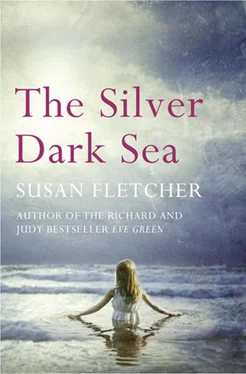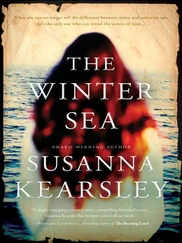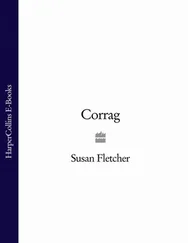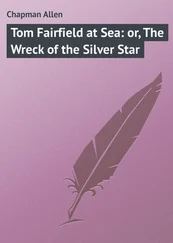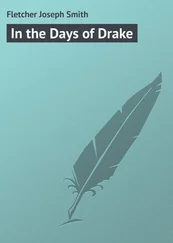It was hard to have faith in that part. When I heard there is hope on a coastline, it was my own self, speaking – me, as my own comfort, trying to keep myself afloat. But what harm does it do, to believe in such stories? Mostly I think that it is better to.
There are stories that come from the sea and those are good stories. They are the best I have heard, by far. I know stories, but none are better than those I was told in coastal homes, with sour-smelling oilskins drying by the fire or the pale chalk of whale-bones standing on their ends. I smiled into my hands, as I listened. A brown-eyed man would ask have I told you about …? I’d reply no – tell me … And we’d lean forward towards each other so that our chairs creaked. Salt on the windowpanes.
Stories of loss, mostly. Of the love that came before that loss.
I crawled inside them, cave-like, and held my breath as I looked up.
There were too many stories to count. The sea brought them in, daily. Like the wide, glassy straps of weed that came ashore on the highest tides, they caught the light and beckoned me. A story? I’d come closer and kneel. I’d stare, as they were told. And they were always more beautiful than I thought they’d be when I first heard them, or found them in the sand.
That’s how I imagine it. It’s the best explanation I can give. There were so many stories on that island that it felt like they came in on the tide. Every day, there was something. On every pebbled cove or beach there were gifts left by the sea – plastic bottles, nylon ropes, shoes, a tyre, cottonbuds, the spokes of an umbrella, a sodden child’s toy. Worthless? To some, maybe. But they were treasures, to others. A parched curve of driftwood could be dragged home and kept; a message in a cola bottle might change a life. At the beach called Lock-and-Key, there were lone wellington boots set upside down on its fence-posts – boots that had been washed up on that beach and were useless without their other, missing halves – and I’ve heard them called unsightly , this row of coloured boots. But I came to like them. I ran my hand across them when I walked on Lock-and-Key. I felt like I was one of them – weathered, and waiting. Fading and softening and watching the sea.
That’s me, perhaps: the forager. I’d be drawn to the shards, to what life leaves behind. As if I had nothing, I gathered what other people would pass by or step over – a mussel shell, still hinged, or a length of sky-blue rope. I trod along the line of weed and plucked, bird-like, at the shinier things. And in that same way I hoarded all the stories that reflected the light and dazzled me – like the whale that answered the foghorn, or the phosphorescent night. There was a tale of grief I heard – with puffins in it, of all things – and I fell upon that tale as if it were unsalted water, water I could drink. It nourished me, somehow. A tale, too, about a single lantern that bobbed on the horizon every Christmas Night.
So yes – it was like beachcombing. It was all treasure to me. In my kitchen, I kept shells; I stuck briny feathers in vases. And in my head I laid out the stories the islanders told me – the caves, the Fishman, the flakes of silver, the seals who are wiser than humans, the girl who floated like a patchwork star.
I was born inland. I grew up where the wildest water was a puddle, or a filmy pond in a park. Stories were harder to come by there. Trees bowed with the rain, and I found sparks of beauty in a flowerbed or a pigeon’s trembling, iridescent neck but it was not enough. I hungered for more – I sensed, always, that there was something more than this life that I was living. And then I fell in love when I thought I never would, and I came to live on an island so that the lines by my eyes deepened and my hair thickened with salt and ghostly-white crabs flitted over my feet and buried themselves in the damp sand, and every sea was different from the sea that had come before it – pummelling, or silent, or brown-coloured and flat. And the man I loved would tell me his stories. In time, others did. They poured whisky into my glass and settled beside me. They opened old books, said look … I have known people who believed absolutely that a gull could talk our language, and that the souls of their drowned friends could be found in the rattle and foam.
I heard her voice in the water. I did.
And I’ve felt his hand on my hand, on that boat. You have my word.
I do have their words – I do. I swagger with the weight of my wordy, priceless stash. And when I re-tell their stories now, I know that some people mock me or mock the island, and they shake their heads at the impossibilities – a Fishman? OK, right … I understand that – for I was, briefly, like them; I too have had my private doubts. But so much has been lost and found. So many things have come to pass that have no explanation and I half-wonder if you cannot believe in such stories unless you have lived or stayed in a house by the sea – until you have lost washing to a sea breeze or been bruised by the rain drumming on your anorak hood whilst trying to guide a dinghy in, in the blackest night. Until you have waited for a boat that does not come. Or until that boat is found but its crew is not. It is another way of living and not all can stand it. There is the word salt-bitten ; it comes when hope is lost.
No, you cannot trust the sea – even now. Even with our satellites that tell us where we are. Even with our sonars, radars and computerised charts. Even with our space travel and vaccinations and our atom bombs and cloned sheep, and even though we can make a new human life in a Petri dish, we still cannot reach the furthest sea floor. We cannot breathe underwater or decode whale song. We cannot find a body, when it goes overboard. We may know that a human heart has ventricles and can be shocked into beating again, but we do not have the words for what immense and extraordinary emotions it can feel – what heights and depths, together. Love is too small a word – too small.
Abigail Coyle used to tell me, we only know the foam … A sweep of her arm, over the sea. And I’d walk home understanding her.
We do not know it all. That’s what I’d tell myself, when standing waist-deep in water. When I sat on a boat I’d think of what was beneath me – the deep, deep chasms, the secrets and the dark.

This island is small, neatly shaped. Its cliffs are high as towers and streaked with white from the roosting birds. These cliffs echo with bird calls and to look up at them from a rocking boat is to feel tiny, and cold. Feathers come down and settle by your feet. They drift on the water like dreams.
There aren’t many trees, on this island. Nor are there many houses, but there are some; they all have missing tiles, damp window frames and peeling paint. Their names are blunt: Wind Rising , or Crest . Calor gas bottles stand by back doors.
There is litter on the beaches. The wheel-arches of cars are brown with rust.
Strands of grey fleece shake on wire.
There is a lighthouse, too. It stands at the north end of the island and swings its slow, pale beam over the fields, the bedroom walls and the night-time sea.
Let us call it Parla. Names do not matter, as they never truly do in the tales I know. What matters are the people themselves – the souls who have lived on this island and how they have felt on its sand and rocks. Many generations of firm, resolute people have mended their nets here, or pressed their knees onto sheep as they’ve sheared them. The men have caught gannets for eating; women have gathered seaweed at low tide, with baskets strapped to their backs and their skirts hitched up. They have fed their children kale and sour milk, sang their sea songs, and they’ve lived in fear of God and the waves. That was years ago. But there are still photos – blurred, soft-edged.
Читать дальше
